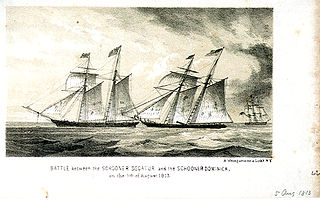Thirteen ships of the British Royal Navy have been named HMS Surprise or HMS Surprize, including:
Eight ships of the Royal Navy have been named HMS Atalanta or HMS Atalante after the athlete in ancient Greek mythology.

HMS Fantome was an 18-gun brig-sloop of the Royal Navy. She was originally a French privateer brig named Fantôme, which the British captured in 1810 and commissioned into British service. Fantome saw extensive action in the War of 1812 until she was lost in a shipwreck at Prospect, Nova Scotia, near Halifax in 1814.

Astrée was a 44-gun Pallas-class frigate of the French Navy, launched at Cherbourg in 1809. In December of the next year she captured HMS Africaine. The Royal Navy captured Astrée in 1810 and took her into service under her French name, rating her as a 38-gun frigate, but then in 1811 recommissioned her as HMS Pomone. She served during the War of 1812 and was broken up in 1816.
Liverpool Packet was a privateer schooner from Liverpool, Nova Scotia, that captured 50 American vessels in the War of 1812. American privateers captured Liverpool Packet in 1813, but she failed to take any prizes during the four months before she was recaptured. She was repurchased by her original Nova Scotia owners and returned to raiding American commerce. Liverpool Packet was the most successful privateer vessel ever to sail out of a Canadian port.
HMS Moira was a British 14-gun schooner of the Royal Navy, that plied the waters of Lake Ontario and the St. Lawrence River during the War of 1812. Initially constructed for the Provincial Marine in 1805, the vessel took part in the Engagements on Lake Ontario. Renamed Charwell in 1814, following the war, the vessel became a powder hulk and an accommodation vessel. The vessel was sold in 1837.

HMS Wolfe was a 20-gun sloop-of-war, launched at the Kingston Royal Naval Dockyard at Kingston, Upper Canada, on 22 April 1813. She served in the British naval squadron in several engagements on Lake Ontario during the War of 1812. Upon her launch, Wolfe was made the flagship of the squadron until larger vessels became available. Along with the naval engagements on Lake Ontario, Wolfe supported land operations in the Niagara region and at the Battle of Fort Oswego. Following the war, the vessel was laid up in reserve and eventually sold in 1832.
HMS Lord Melville was a brig of the Royal Navy launched at Kingston, Ontario, on 20 July 1813. Initially designed as a schooner, she was altered to 14-gun brig in 1813. She served on Lake Ontario during the War of 1812, and was renamed HMS Star on 22 January 1814. By 1815, she was unfit for anything but transport duties. She was sold in 1837.
Halifax commonly refers to:

HMS Blossom was an 18-gun Cormorant-class sloop-of-war. She was built in 1806 and is best known for the 1825–1828 expedition under Captain Beechey to the Pacific Ocean. She explored as far north as Point Barrow, Alaska, the furthest point into the Arctic any non-Inuit had been at the time. She was finally broken up in 1848.
Ten ships of the Royal Navy have borne the name HMS Confiance:

HMS Dominica was the French letter of marque schooner Duc de Wagram, which the British captured in 1809 in the Leeward Islands and took into the Royal Navy in 1810. The American privateer Decatur captured her in 1813 in a notable single-ship action. However, Majestic recaptured her in 1814. She was wrecked in 1815
Grecian was an American schooner launched in 1812. During the War of 1812 she received a letter of marque. The Royal Navy captured her on 5 February 1814 and took her into service as HMS Grecian. She was sold in 1822. In 1823 she became a merchantman. In 1824 the Chilean Navy captured her, but she escaped, and thereafter may have served for a time as a Spanish privateer. After the end of the Peruvian War of Independence she apparently returned to more conventional pursuits and was probably lost in 1829 though she was still listed in 1830 as sailing between London and Lima.
Four ships of the Royal Navy have borne the name HMS Grecian:
At least seven vessels of the Royal Navy have borne the name HMS Firefly:
Many vessels have been named Comet, after the astronomical object comet.
This page is based on this
Wikipedia article Text is available under the
CC BY-SA 4.0 license; additional terms may apply.
Images, videos and audio are available under their respective licenses.




